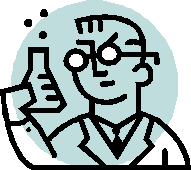

| I am sticking this on here in a hurry July 7, 2006. Watch back here as I may work on the ending some day soon. If this page ever gets "fixed" this message will be removed. |
 |
 |
May 11, 2006
I am writing about “intellectualism” vs. “anti-intellectualism”. This is an essay using perceptions. I am using a lot of, “generalities” rather than, “cold hard facts”. The whole idea is to express what I perceive to be, “generally held ideas”. (Ok, I am stereotyping.) This is, “just how I see it”. If I am wrong in any way, let me know. I also use the “inclusive noun” “men” a lot. It was good grammar when I was in school. I don’t see why it isn’t good grammar now. I don’t know how to be politically correct or would that be “gender correct”. I’m not trying to be “sexist”. (I’m a girl too, you know. And yes, I do know that scientists can be female.)
There is this notion that there is, “anti-intellectualism” amongst “ordinary people”, i.e. people of our “heartland” (in some cases “red states”). It could be argued that these people are not highly educated so they are, “against” what they don’t understand. When you throw in the fact that these people tend to be “religious” then terms like, “superstitious” and “superstitions” get used. “Those people would rather believe in their superstitions than believe in science”. On the other hand, an opposite view is that people of the heartland value hard work and tend to be more skilled in, “horse sense” than they are at, “book learning”.
I know that for a long time rural people tended to value hard physical labor. I read an account of a doctor who “nearly starved to death” as he got a high school education. His parents had been told by their minister that if they sent him to school with only bread and potatoes, he would get so hungry that he would quit his education and come home. This man was determined to become a medical doctor, this didn’t stop him. “Book learning” wasn’t valued as much as common sense.
There are these stories of the man in the white lab coat who spends all day trying to do something simple. And then the rural less educated person comes around and knows the right switch or whatever (plugs the item into the power source maybe). What the highly educated person took all day to try to figure out the less educated person did in seconds. People also have similar stories about government and other bureaucracies. It is like the efficiency expert who works his “magic” on a company. And when he is finished the company is less efficient than when the “expert” did his thing. The British have a term for the men in the white lab coats, “boffin”. For some reason when I see or hear that word, my mind thinks “buffoon”. I don’t mean that I think of these men in the white lab coats as “buffoons”. It is just that the words are similar and one word reminds me of the other one.
Scientists will be the first to say that they don’t know everything. Yet if you have any sort of viewpoint that is opposite of “generally held beliefs”, you are anti-science. Sometimes these “skeptics” are labeled as, “superstitious”.
One of my “pet subjects” is herbal medicine. Some people think that to “practice” herbal medicine is like practicing witchcraft. Some “scientists” lump herbal medicine in with witchcraft. There is no scientific proof that such and such an herb is really good for a particular illness. Yet, these same scientists readily acknowledge that some of these herbs contain harmful substances in them. On the one hand there’s no proof that the herb will do anything beneficial to cure your illness. But on the other hand, the herb has poisons in it that can harm you. It doesn’t do any good to point out that a good many of the prescription drugs on the market today come from plants. You see, it took a scientist to “synthesize” the “active ingredient” out of that plant. A person needs to have a way to control the dosage and insure that none of the harmful chemicals in the plant are taken along with the good stuff. Some of that makes sense. A big perception by people into “alternative health,” is that there is a conspiracy to keep “informed” people from “self medicating” as, doctors, and drug companies experience a loss of revenue when someone self medicates.
One big thing is that ordinary people do not always know exactly how science works. Most people know they can flip a switch and get light from the light bulb. But if you ask them what happens to make it work, they couldn’t tell you. It involves a current of electrons going through a wire into the light bulb. Most people don’t want to know about that, they just want to flip the switch and have the light come on. I am sure it is very frustrating to scientists when people consistently do not understand simple things about their work.
I know at one point a few years ago, they tried (AND failed!) to get a law passed that would have made it mandatory that “sound science” would be used to determine what animals get on the endangered species list. The property rights advocates were cheering this bill on. The environmentalists said it would “gut” the endangered species act. It sounded like a good idea to me though. I don’t know how it works, but one perception that I have is that animals get on the endangered species list according to a similar scenario. I know it is probably a wrong perception. But this is how it seems.
Suppose you have two “scientists” in a U.S. forest, somewhere in the contiguous 48 states.
Scientist 1: “I don’t hear any penguins. Do you hear any penguins?”
Scientist 2: “No, I don’t hear any penguins either. We should look for their droppings and count the number of penguins that way.”
Scientist 1: “I do not find any penguin droppings. Do you see any penguin droppings?”.
Scientist 2: “No! I see no penguin droppings.”
And then these “scientists” become activists and lobby the right agency so that penguins get on the endangered species list. They become the squeaky wheel that gets the oil. Of course nobody bothers to remember that penguins are not native to North America.
That scenario might not be how it is done. People spend a good deal of money to buy land. And then some government agency or environmentalist says they can’t use the land for the purpose it was bought for. What are people supposed to think in such situations. Most people do not understand how you can get an idea of the size of a particular animal’s population by counting it’s dung. The main reason I would think, is without seeing “who” dropped that, how can you know one bit of dung was left by another animal. How do you know which animal left that each piece of dung you find. There could be two penguins in the forest, but unless you see which one left the droppings, you don’t know. Just because you find four piles of dung that doesn’t mean there are four penguins. (Or does it?)
Another big perception… “Politics” in science. Like I wrote earlier, the squeaky wheel gets the oil. Sometimes it is perceived that the scientist with that squeaks the loudest, he is the one that gets the oil. The “Chicken Little” that yells the loudest and hardest that the sky is falling, gets the most inches in the news papers. In academia there is this saying, “publish or perish”. Professors do not always have time to teach because they have to write. They have to research and write papers or books. If they do not do this, they don’t get tenure eventually. As I understand things, in order to get published, the professor has to have a “wackier” theory than the next guy. The scientific journals wouldn’t print the paper if it was about how round the earth is. They want something new and different. Now, if that scientist promotes his “wacky” theory to the point that it becomes “accepted”, then he squeaked loud enough to get oiled. It seems to some people that because of “politics” in science, some ideas get preferential treatment to others. At times it seems that the scientists that get into the news papers promote theories in the same vein. “Global warming” is a good example. If there are any scientists who say that the jury is still out and that certain evidence does not suggest that “global warming” is happening, these people are not treated as seriously.
There is this perception that scientists are not always accurate and that they could be wrong. Some scientists/doctors that go “against the grain” are thought of as, “Galileos” by their followers. Another perception that goes along with this is that the scientists who agree with the “generally accepted theory” are snobs against skeptics. (Yet again, “global warming” is a good example.)
Speaking of “global warming”… If a scientist is a skeptic, they are seen as “for big business” or maybe “corporate lackeys”. Some of us can remember what scientists were saying back in the 1970’s. They warned that we were headed for an ice age. Well, if you believe the “current wisdom”, then the ice age is headed for meltdown. My personal opinion is that the scientists can give us their best educated guesses. When those guesses don’t come out exactly as they “predicted”, then the scientists have to go back to the drawing board. That doesn’t mean, that I don’t believe that scientists can be right.
There have been Biblical ministers in the past that gave an exact date that Jesus Christ would return. Well, those dates came and went. Those ministers had to revise their theories. I heard of one group in Australia that sold their belongings, built a stadium and waited for Jesus Christ to return. They aren’t still sitting there waiting after all these years. I think some of those people may have sued. I do not have all the facts though.
I see a disparity between the experts and the general public. I wrote about science. Now, I am going to write about art.
July 7, 2006
There are a lot of people who like “realism” in paintings. I know very few people who actually like Picasso’s famous paintings. If you look at his early work, you see that he really had talent. I don’t know exactly what happened to him in order to cause him to paint his famous works. Most people I know what something pleasing to the eye to hang on their walls. They do not want a painting that you scratch your head and wonder what the subject of the painting is. Picasso’s early work does not command the high prices. It is his “Cubist” paintings that bring the high prices.
At one time “they” considered Rembrandt to be the greatest painter to have ever lived. Now, “they” consider Picasso to be the greatest artist.
An artist that “ordinary” people like is Colombian artist Fernando Botero. I’m not saying I “agree” with every painting this man has done. I am just saying, that when you see his work, you know what he has painted. “60 Minutes”, once did a story on Mr. Botero. They showed a coffee table book of his paintings, to a New York art person. She flipped through it quickly and said something to the effect that the paintings were junk.
One year (1998) Chris Ofili won the Turner Prize. That’s the big British art prize given out in London, England every year. His painting was painted with amongst other stuff, “elephant dung”. Around the same time they were holding a John Singer Sargent exhibition in London. I didn’t see the Chris Ofili painting, but I couldn’t figure it out. Why couldn’t the Turner Prize judges have been inspired by the John Singer Sargent paintings and award their prize accordingly?
Another thing… I have a nice book about Radio Drama. It barely mentions “soap operas”. If you look at radio schedules from the “golden age of radio”, you will find that most of the day was devoted to “serials”. Not all of those “serials” were soap operas. The book I have is very scholarly. It mentions very little about Irna Phillips. She invented the soap opera. This book says nothing about Fibber McGee and Molly.
Sometimes it seems that if certain television or movies are to be considered, “good” by the critics, they have to be, “dark” and “moody”. There can’t be anything, “uplifting” considered, “good” as, “sentimental” isn’t, “good”.
I don’t know why “gloomy” is “good”. I don’t know why what ordinary people prefer on their walls is “bad”. Why is there a disconnect between what the critics consider, “good” and what most people I know consider, “good”? A person shouldn’t have to get a P.H.D. in art in order to know what, “beauty” is.
